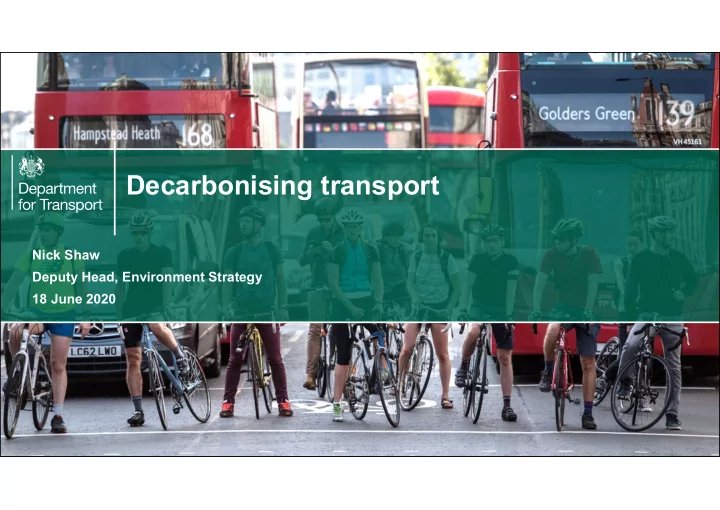

Decarbonising transport Nick Shaw Deputy Head, Environment Strategy 18 June 2020
Transport is the UK’s largest GHG emitter UK domestic emissions 1990-2018 (MtCO 2 e) • In 2018, 28% of the UK’s greenhouse gas (GHG) 300 emissions were from transport. • Since 1990 other sectors have reduced emissions 250 dramatically with total domestic emissions 200 dropping by 43% , but transport has fallen only 3%. • In June 2019 UK legislated for “net zero” GHG 150 emissions across the economy by 2050. Transport Energy 100 • In the interim, “carbon budgets” set five year caps on Business Residential economy-wide GHG emissions out to 2050. 50 Agriculture* Waste Other** 0 1990 2000 2010 2018 Source: BEIS Greenhouse Gas Emissions National Statistics/NAEI
The scale of the challenge • Chart presents the MtCO 2 e savings achieved from firm and funded policies in the “Current policy projection”. • DfT projects transport emissions to fall steadily as a result of the existing firm and funded policies, but that the speed of reduction is much slower than what is likely to be needed if transport is to fully play its part in contributing to our legal obligations. • Current policy projections only deliver half of the emissions reductions required for 2032. • The projection depends on how quickly technology evolves and how quickly DfT’s latest domestic GHG emissions projections based on current policies, compared consumers adopt these new technologies, to Clean Growth Strategy (CGS) targets and CCC Net Zero ‘Further Ambition’ and ‘Speculative’ scenarios. as well as how individual travel behaviour changes over the coming decades. Source: Decarbonising Transport: Setting the Challenge (2020)
Plan for a plan • On 15 October 2019, Transport Secretary announced development had started to create the UK’s first Transport Decarbonisation Plan: • “to bring together a bold and ambitious programme of coordinated action needed to end the UK’s transport emissions by 2050.” • The Transport Decarbonisation Plan will be a ground- breaking plan to achieve net zero emissions across every single mode of transport. • It will consider how UK technology and innovation, place- based solutions, and modal shift can be implemented to encourage major changes to the way people and goods move across the UK. • It will build upon existing and ongoing work in transport decarbonisation.
Decarbonising Transport: Setting the Challenge Decarbonising Transport: Setting the Challenge was published on 26 March 2020 Vision for how a net zero transport system will benefit us all : • Public transport and active travel will be the natural first choice for our daily activities. We will use our cars less and be able to rely on a convenient, cost- effective and coherent public transport network. • From motorcycles to HGVs, all road vehicles will be zero emission . Technological advances, including new modes of transport and mobility innovation, will change the way vehicles are used. • Our goods will be delivered through an integrated, efficient and sustainable delivery system. • Clean, place-based solutions will meet the needs of local people . Changes and leadership at a local level will make an important contribution to reducing national GHG emissions. • The UK will be an internationally recognised leader in environmentally sustainable, low-carbon technology and innovation in transport. • We will lead the development of sustainable biofuels, hybrid and electric aircraft to lessen and remove the impact of aviation on the environment and by 2050, zero emission ships will be commonplace globally. Source: Decarbonising Transport: Setting the Challenge (2020)
Decarbonising Transport: Setting the Challenge • Decarbonising Transport: Setting the Challenge presents six strategic priorities for decarbonising transport. • Focus on maximising co-benefits - “The positive effects that a policy or measure aimed at one objective might have on other objectives” e.g. Public health benefits through increased active travel and improved air quality; Scope: • Consider ‘in use’ GHG emissions from transport, meaning those emissions generated from the operation and use of the UK’s transport system. • In addition, the choices people and businesses make about travel and transport will be considered, Out of scope • GHG emissions associated with power generation and distribution for transport, and construction of transport infrastructure, noting their consideration in other policy areas. Source: Decarbonising Transport: Setting the Challenge (2020)
Decarbonising Transport: Car dependency and use Percentage of journeys to work by car
Acting now and in the future
Our ambition for place-based solutions Emissions are not consistent across the country and a single solution for effective emissions reduction will not necessarily be appropriate for every location. Over the coming months we will seek to: Consider clean place-based solutions that meet the needs of local people. Changes and leadership at a local level will make an important contribution to reducing national GHG emissions. Work with local authorities and other regional bodies to identify and support place-based solutions for the greatest polluting areas, to help enable lower carbon communities. A range of potential measures will be considered to encourage progress. Work with relevant stakeholders to consider how local management of transport systems can best address emissions at a local level. 9 9
Thank you TDP@dft.gov.uk
Recommend
More recommend